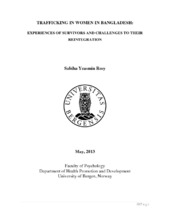| dc.contributor.author | Rosy, Sabiha Yeasmin | |
| dc.date.accessioned | 2013-09-30T12:16:14Z | |
| dc.date.available | 2013-09-30T12:16:14Z | |
| dc.date.issued | 2013-05-31 | eng |
| dc.date.submitted | 2013-05-31 | eng |
| dc.identifier.uri | https://hdl.handle.net/1956/7328 | |
| dc.description.abstract | This study aims to focus on the challenges behind the reintegration process of trafficking survivors in their families and communities in Bangladesh. In doing so, this research tries to explore the experiences of trafficked survivors in the process of being trafficked, their life in brothel and returning to Bangladesh. In addition, it helps to understand the perception of survivors in their reintegration along with the perceptions of community people and family members. This study also brings forth in discussion how their experiences in brothel and challenges to reintegration have affected their construction of identity. This research was carried out with the help of BNWLA and it intends to find out what BNWLA is doing to reduce those challenges. This study is consisted of 12 in-depth interviews with trafficking survivors, two focus group discussion with community people, some interviews with survivors’ parents and BNWLA key persons. The data was collected in June-August and analyzed the data using two different theories: Empowerment theory and Stigma theory. Thematic approach has been used to analyze data. The study findings show that reintegration of survivors is challenging. Shelter home provides facilities to the survivors to recover themselves. It takes long time to recover psychologically for the survivors and they lose the self interest to return to community. Self stigmatization of survivors becomes severe when they start living in community. BNWLA is working to change people’s mind about the reintegration of survivors and provide facilities to the survivors to get empowered. However, the empowerment of survivors is not easy due to poverty and stigma imposed by the community people. This study recommends to increase the awareness among people about survivors’ reintegration. BNWLA should be more strategic to ensure sustainable sources of income that will stop the survivor re-trafficking. Government, donor agencies and other NGOs should collaborate with each other to strengthen the anti-trafficking program and facilitate the reintegration of survivors. | en_US |
| dc.format.extent | 927672 bytes | eng |
| dc.format.mimetype | application/pdf | eng |
| dc.language.iso | eng | eng |
| dc.publisher | The University of Bergen | eng |
| dc.subject | Bangladeshi women trafficked survivors | eng |
| dc.subject | Reintegration | eng |
| dc.subject | Empowerment | eng |
| dc.subject | Stigma | eng |
| dc.subject | Self identity | eng |
| dc.title | Trafficking in Women in Bangladesh: Experiences of Survivors and Challenges to their Reintegration | eng |
| dc.type | Master thesis | |
| dc.rights.holder | Copyright the author. All rights reserved | |
| dc.description.degree | Master of Philosophy in Gender and Development | |
| dc.description.localcode | GAD350 | |
| dc.description.localcode | MAPS-GAD | |
| dc.subject.nus | 739999 | eng |
| fs.subjectcode | GAD350 | |
